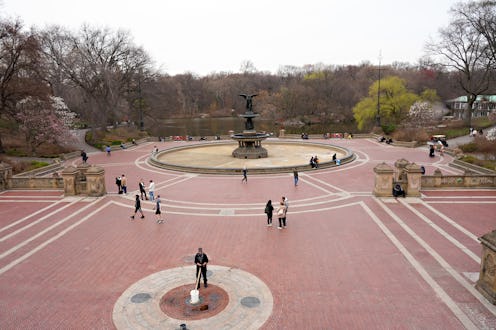Life
How To Take A Social-Distancing Walk Responsibly, According To Doctors

The Centers for Disease Control and Prevention (CDC) is recommending that everybody, including those without symptoms of COVID-19, practice social distancing right now, keeping at least 6 feet from others and avoiding parties, crowds, and any non-essential business. But that begs the question — is the laundromat essential? (Yes.) Is food delivery dangerous? (No, but use contactless delivery if you can.) Is going outside and taking a walk going to spread coronavirus?
If you're not in quarantine, meaning actively watching for symptoms to develop, or in isolation, a bit of activity outdoors is a good idea. "You want to maintain activity and exercise — just don’t go for a walk in a dense, crowded area," Dr. Janette Nesheiwat M.D., a family and ER doctor, tells Bustle. Research shows that green spaces can aid mental health, with studies demonstrating that everybody from children to the elderly experience mental health boosts from time spent outdoors in nature. Going for a walk might be particularly helpful if you're experiencing adverse mental health symptoms as a result of being cooped up.
However, experts advise caution for the duration of the coronavirus outbreak. "Keep a 6- to 10-foot distance between you and others, and avoid gatherings of more than 10 people, which is the recommendation of the CDC," Nesheiwat says.
How To Have A Walk Safely
If you do go for a walk, you should avoid shops, public events, and other areas where people might congregate. If people are gathered around a dog doing an adorable trick, steer clear (sorry). Walk briskly if you can, Dr. Teresa Bartlett, M.D., medical director at Sedgwick, tells Bustle. “Physical activity is known to boost your immune system, so exercise is a good idea," she says.
Location matters when it comes to your walk. "If it's Manhattan, and Central Park is full of 10,000 other people taking a walk, there would be risk of transmission," Dr. Larry Burchett, M.D., a family physician, tells Bustle. If you're going to take a walk, he recommends picking remote areas and staying 6 feet away from everybody at all times. Hanging out at a remote beach, for instance, would work — but with anytime you go off to an unfamiliar location by yourself, always let a friend know and tell them when you'll be back.
If you've been around anybody who's been diagnosed with coronavirus, however, you need to stay home, even if you're not showing symptoms, for at least two weeks. Other people who shouldn't go for walks include the elderly, people who are immunocompromised, currently on chemotherapy, and anybody with heart disease, lung disease, and kidney disease, Nesheiwat says. "Those who have these conditions are at risk of complications from coronavirus, as it is a highly infectious and highly contagious disease," she says.
Should You Get Together With Others For A Coronavirus Walk?
You can walk with a friend who lives close by if you continue to observe social distancing. "If you go with a friend, just make sure you are maintaining a 6-foot distance between you," Bartlett tells Bustle. "Do not go with anyone who has any symptoms of illness or if you are having symptoms yourself. It is best to stay indoors and protect yourself and others from the viral spread.”
You should wash your hands before and after your walk to make sure you haven't picked up or spread any pathogens. Hand sanitizer with 60% alcohol or more, or 20 seconds with soap and water, will be enough. If you're confined at home and feel the need for some outside time, gardens, zoos, and museums around the world are all offering online tours for people staying home, so you can still get a bit of greenery in your life without stepping out the door.
Going For A Walk During The Coronavirus Outbreak Depends On Where You Are
Right now, California has issued a statewide "stay at home" order, so people should only leave their houses when absolutely necessary. New York will adopt similar measures on March 22. Both states say that a walk or a hike is OK. In Spain, however, people can face fines for leaving the house for anything other than food shopping, getting medication, and other essential services. Check out your local government's response, particularly as things are evolving day by day. If you've been recommended to self-quarantine by a doctor, or have been told to stay inside, try some at-home workouts instead.
Experts:
Dr. Teresa Bartlett, M.D., SVP and medical advisor for Sedgwick
Dr. Larry Burchett, M.D., family medical specialist
Dr. Janette Nesheiwat, M.D., family and ER medical specialist
This article was originally published on